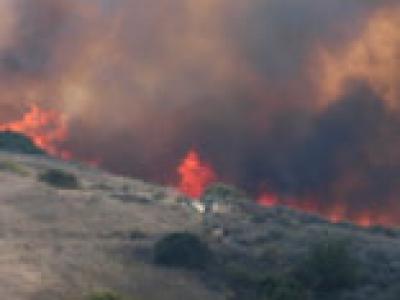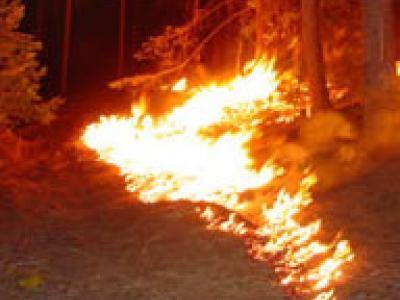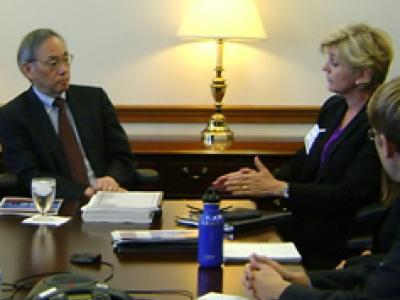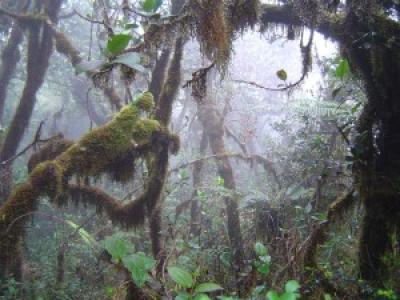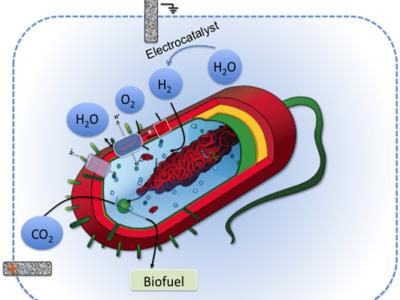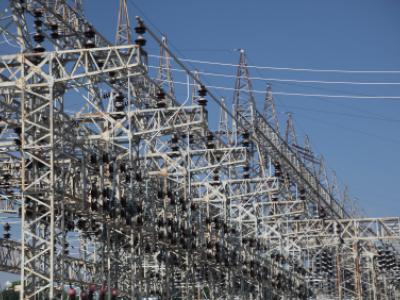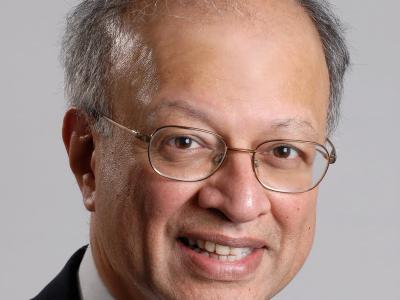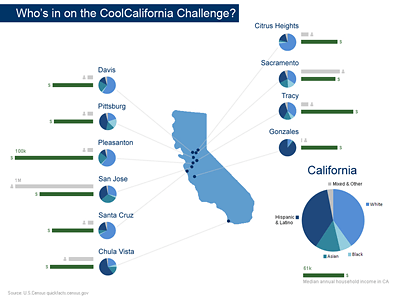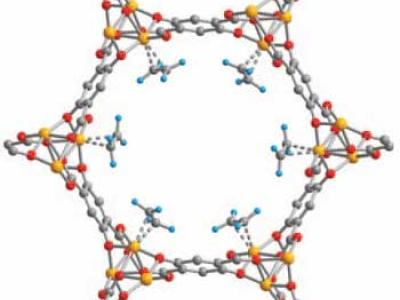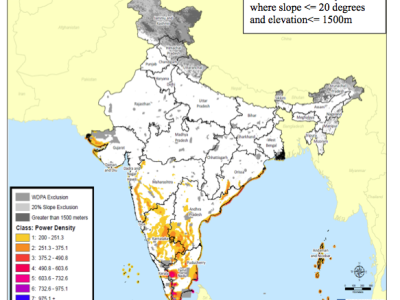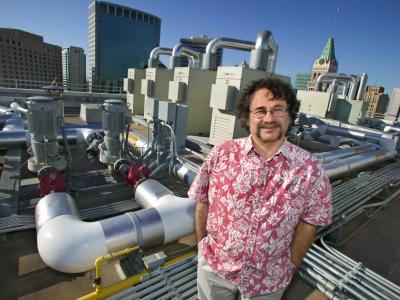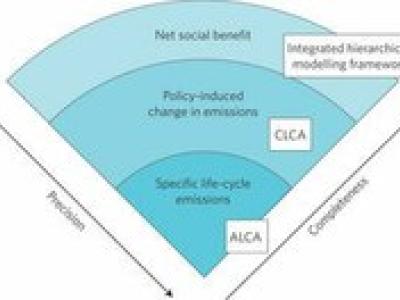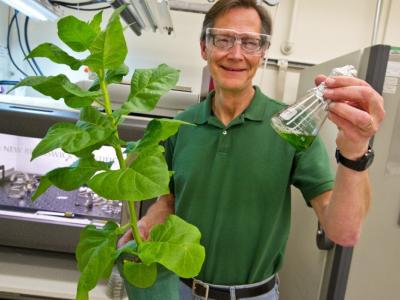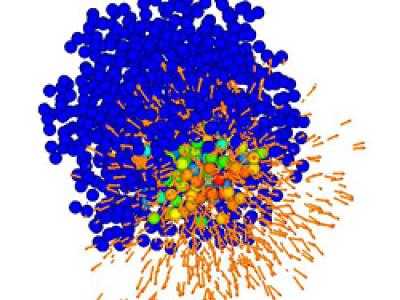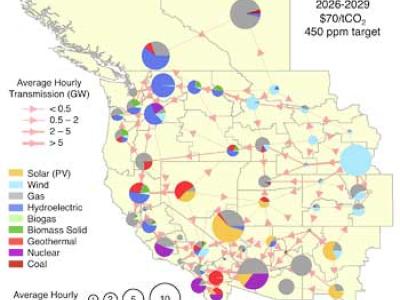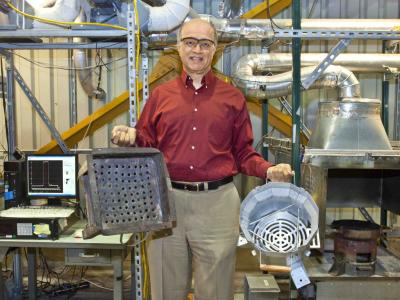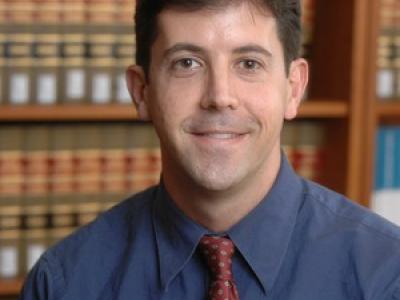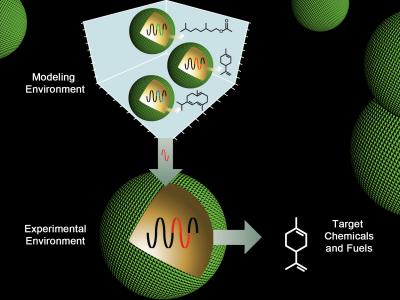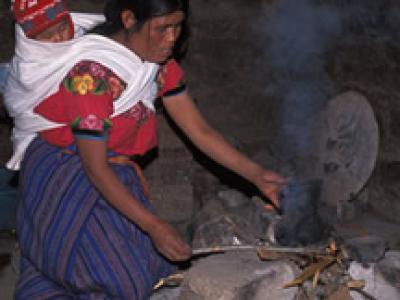UC Berkeley Chemists Installing Carbon Dioxide Sensors in Oakland
Using inexpensive detectors that can fit inside a shoebox, UC Berkeley chemists are installing carbon dioxide and other air pollution sensors in 40 sites around Oakland to explore how detailed, neighborhood-by-neighborhood information can help communities monitor greenhouse gas and other harmful emissions.
Two UC Berkeley grads launch printable battery startup
With moral and monetary support from UC Berkeley and UC’s Office of the President, two UC grads – Christine Ho and Brooks Kincaid – have formed a company to create ‘printable’ batteries that are efficient, environmentally friendly and could be made as small as a postage stamp. The start-up is a tribute to the campus’s entrepreneurial environment and its innovative students.
Analysis of global fire risk shows big, fast changes ahead
Climate change is widely expected to disrupt future fire patterns around the world — with some regions, such as the western U.S., seeing more frequent fires within the next 30 years, according to a new analysis led by UC Berkeley researchers in collaboration with an international team of scientists. The study used 16 different climate-change models to produce one of the most comprehensive projections to date of how climate change might affect global fire patterns.
Let it burn: Prescribed fires pose little danger to forest ecology, study says
UC Berkeley-led research is giving the green light to fighting fire with fire. An analysis of controlled burns and mechanical thinning nationwide did not find substantial ecological harm from fuel-reduction treatments used to reduce the risk of catastrophic wildfires. And with a rise in wildfires predicted in many parts of the country, researchers say more treatments are needed to manage this risk.
UC Berkeley students present recommendations for clean energy policy in Washington, DC
A group of students from UC Berkeley met with top energy policy makers in Washington DC to present their recommendations on developing a national clean energy plan. These recommendations were based on an extensive report that represented the culmination of a semester's worth of work in the class “Renewable Energy and Other Cleaner Fuels: Energy Policy to Save the Planet, the Country, and the Economy” co-taught by Jannifer Granholm and Steve Weissman in spring 2012.
Environmental ed project teams Berkeley with global practitioners
Hazy days: Berkeley Lab tackles pollution in Mongolia
Scientists at UC Berkeley and LBNL convert carbon in tobacco leaves to biofuel
Electricity-generating viruses could lead to pocket power plants
Scientists at UC Berkeley and Berkeley Lab have harnessed the electricity-generating capabilities of viruses, a development that could lead to pocket power plants for mobile devices.
Microbe that can handle ionic liquids
Beyond the high-speed hard drive: topological insulators open a path to room-temperature spintronics
Berkeley Lab researchers and their colleagues demonstrate unique new materials for innovative electronic and magnetic applications
Scientists Core Into Clear Lake to Explore Past Climate Change
One of the oldest lakes in the world, Clear Lake has deep sediments that contain a record of the climate and local plants and animals going back perhaps 500,000 years. UC Berkeley scientists are drilling cores from the lake sediments to explore this history and fine-tune models for predicting the fate of today’s flora and fauna in the face of global warming and pressure from a burgeoning human populations.
From soil microbe to super-efficient biofuel factory?
Berkeley Lab scientists are exploring whether a common soil bacterium can be engineered to produce liquid transportation fuels much more efficiently than the ways in which advanced biofuels are made today.
Ashok Gadgil gets $100,000 award for global innovation
The Lemelson-MIT Program has awarded Ashok Gadgil, professor in the Department of Civil and Environmental Engineering, the 2012 $100,000 Lemelson-MIT Award for Global Innovation. The award recognizes Gadgil, who is known for his work on affordable water disinfection systems and fuel-efficient cookstoves for developing nations, for “his steady pursuit to blend research, invention and humanitarianism for broad social impact.”
Bringing the electric grid into the 21st century
Researchers at Lawrence Berkeley National Laboratory (Berkeley Lab) are working on a project that would modernize the grid and essentially bring it into the Internet age by using automated control software to manage demand in real time.
Cal Energy Corps interns prep for sustainable future
Some 32 Berkeley undergraduates will spend up to 12 weeks working on sustainability projects in the Bay Area and across nine far-flung countries.
Sustainability Summit marks progress toward ever-greener campus
At the campus's 9th Sustainability Summit, progress in "greening" the Berkeley campus was everywhere evident — from the sheer number of student projects in the works to the metric tons of greenhouse gases not being emitted thanks to new institution-wide programs.
CalCAP wins clean-air leadership award
Let there be light! Solar cells that emit photons break efficiency record
Berkeley Lab to lead a U.S.-India clean energy research center
Lawrence Berkeley National Laboratory (Berkeley Lab) has been selected to lead a new joint U.S.-India research center focusing on energy efficiency technologies for buildings.
Berkeley researchers tackle California's carbon footprint
The Cool California Challenge brings together 10 cities in a yearlong community-based competition to cut carbon emissions — with the winner crowned California’s Coolest City.
Fertilizer use responsible for increase in nitrous oxide in atmosphere
UC Berkeley, chemists have found that increased fertilizer use over the past 50 years is responsible for a dramatic rise in a major greenhouse gas contributing to global climate change.
New material cuts energy costs of separating gas for plastics and fuels
A new type of hybrid material developed at UC Berkeley could help oil and chemical companies save energy and money by eliminating an energy-intensive gas-separation process.
Berkeley Lab study shows significantly higher potential for wind energy in India than previously estimated
A new assessment of wind energy in India by Lawrence Berkeley National Laboratory has found that the potential for on-shore wind energy deployment is far higher than the official estimates.
Green jail to demonstrate power of microgrids
Berkeley Lab scientists are helping enable the Santa Rita Jail in Dublin, California, to run its own microgrid, which will minimize costs and maximize reliability.
Risks of bioenergy underestimated, new report says
Fill 'er up with tobacco? Berkeley Lab-led team explores new path to biofuels
Next week's ARPA-E Summit will feature several Berkeley Lab-led projects, all aimed at dramatically improving how the U.S. produces and uses energy. Among them is an effort to produce transportation fuel from tobacco.
Engineering to offer energy major for undergrads
Beginning this fall, the new Energy Engineering major will admit up to eight new students each year.
Advanced power-grid model finds low-cost, low-carbon future in West
A new study by UC Berkeley researchers state that replacing coal with renewable energy can help reduce greenhouse gas emissions in a least expensive way.
Berkeley Lab launches new institute to build low-carbon pathways to prosperity
To broaden and accelerate its efforts at poverty alleviation Berkeley Lab announces the launch of the LBNL Institute for Globally Transformative Technologies.
Energy Secretary joins groundbreaking for new LBNL research facility
U.S. Secretary of Energy Steven Chu joined UC and Lawrence Berkeley Lab leaders to break ground on the lab’s new Computational Research and Theory facility.
UC’s green investments pay off
Berkeley Lab’s Ashok Gadgil Wins Zayed Future Energy Prize’s Lifetime Achievement Award
Ashok Gadgil, a scientist at Berkeley Lab, has won the Lifetime Achievement Award of the 2012 Zayed Future Energy Prize, a $3.5 million award that recognizes and rewards innovation, leadership and long-term vision in renewable energy and sustainability.
Biofuels, land and ethics
Climate Change and Business Research Initiative Gains Traction
Environmentalists and corporations don’t always see eye-to-eye on climate change. But the Climate Change and Business Research Initiative has shown that the two sides’ objectives can not only co-exist, but be mutually beneficial.
CAD for RNA
Joint BioEnergy Institute (JBEI) researchers have developed computer assisted design (CAD)-type tools for engineering RNA components to control genetic expression in microbes. This holds enormous potential for microbial-based production of advanced biofuels, biodegradable plastics, therapeutic drugs and a host of other goods now derived from petrochemicals.
Saving on Energy Bills: Meeting Families in the Middle
Berkeley Lab study identifies steps that can deliver significant savings on home energy bills for middle-income households.
Climate change blamed for dead trees in Africa
Trees are dying in Africa’s Sahel, and human-caused climate change is to blame, according to a new study led by a scientist at UC Berkeley. Using climate change records, aerial and satellite images and field data, researchers found that one in five tree species disappeared in the past half-century. They attribute the tree deaths to the historic drops in rainfall and increased temperatures in the region.
Can ‘carbon ranching’ offset emissions in California?
Could cultivating dense fields of weeds help mitigate climate change by soaking up carbon dioxide from the atmosphere? Berkeley scientists Dennis Baldocchi and Whendee Silver are exploring that possibility in California’s agricultural heartland, the San Joaquin Valley. National Public Radio reports.
Bacteria turn switchgrass into advanced biofuels
Jay Keasling and his colleagues at the Joint BioEnergy Institute have engineered bacteria to turn switchgrass – a hard to digest plant – into gasoline, diesel and jet fuels. This could vastly reduce the cost of producing plant-based fuels to replace fuels from oil and coal.
Wood smoke from cooking fires linked to pneumonia, cognitive impacts
UC Berkeley-led researchers have found a dramatic one-third reduction in severe pneumonia diagnoses among children in homes with smoke-reducing chimneys on their cookstoves. Reducing wood smoke could have a major impact on the burden of pneumonia, the leading cause of child mortality in the world, the researchers said. A separate pilot study also found a link between prenatal maternal exposure to woodsmoke and poorer performance in markers for IQ among school-aged children.
UC Berkeley start-up creates energy-efficient buildings
In 2005, Charlie Huizenga and two UC Berkeley MBA graduates started Adura Technologies to install energy efficient wireless lighting systems in buildings. Their technology, based on innovations by UC Berkeley architects and engineers, has significantly reduced lighting costs in more than 2 million square feet of public and private buildings, including UC Berkeley’s undergraduate library.
Transatlantic Science Week brings Norway to Berkeley to tackle global energy challenges
The deep cultural ties that bind UC Berkeley and Norway inspired a call-to-action for greater collaboration on global energy challenges at the launch of Transatlantic Science Week 2011.
Student finds inspiration in the clouds
UC Berkeley graduate student Greg Goldsmith may have his head in the clouds, but he is firmly grounded in the reality of global warming and the danger it poses to the Central American cloud forests he loves. He developed an elementary school curriculum as a way to help save them.
BERC symposium energizes Cal students
Record attendance at last week’s fifth-annual Energy Symposium at UC Berkeley demonstrated the swelling interest among students on campus and nationwide in bridging the gap between universities’ renewable energy research and the private sector.
CalSol zips to the finish in Aussie solar race
UC Berkeley’s Solar Vehicle Team, is one day from successfully completing the 3,000-kilometer trans-Australia World Solar Challenge, which brought 37 solar cars to the Aussie outback. This is the first time Berkeley has competed.
$2.5 million grant to fund global change research
Modified corn genes may improve biofuel efficiency
Lessons to be Learned from Nature in Photosynthesis
Lessons to be learned from nature could lead to the development of an artificial version of photosynthesis that would provide us with an absolutely clean and virtually inexhaustible energy source, says Berkeley Lab photosynthesis authority Graham Fleming and three international colleagues.



